New Zealand's Fonterra Threatened with Infant Formula Contamination

Working with police and government, the global dairy giant assures the public its products are safe.
New Zealand dairy giant Fonterra Cooperative Group said yesterday it is working with police and government officials after receiving a threat to contaminate its infant formula with a pest-control poison.
The threat, apparently received last November, warned Fonterra that its infant and other milk formula would be contaminated with Sodium monofluoroacetate (1080) if New Zealand did not stop using the poison.
Fonterra Chief Executive Theo Spierings said the criminal threat targeted New Zealand and the entire dairy industry.
“We can fully assure our customers and consumers that all of our milk and products are safe and of high quality, and our supply chain continues to be secure and world-class,” Spierings said in yesterday's statement. “We are playing our part in helping the Government manage the criminal threat, as is the rest of the dairy industry.
“We have taken immediate and decisive steps to give our customers and consumers added confidence – including increased testing and security measures,” he added.
Information about who made the threat has not been released. New Zealand police are asking people with “any relevant information” to contact them immediately.
Dairyreporter.com reported that not only Fonterra but New Zealand’s Federated Farmers had received “blackmail letters” last November threatening the formula contamination unless New Zealand ended its use of 1080 by the end of this month. The poison is applied aerially in New Zealand to kill rats, stoats and possums.
Fonterra is the world’s largest global milk processor and dairy exporter. It controls 45% of the global dairy trade. New Zealand exports 95% of the 19 million tons of milk produced by its dairy farmers.
Responding to the threat
This type of threat does occur from time to time internationally, said Scott Gallacher, Deputy Director-General of New Zealand’s Ministry for Primary Industries (MPI). “We are fortunate that this is the first such threat in New Zealand, and that New Zealand has one of the world’s strongest and most secure food safety systems,” Gallagher said.
“This criminal threat is designed to cause fear in order to generate a political outcome,” he added. “It is using food as a vehicle but should not undermine confidence in our world-class food safety system or in any manufacturer.”
Since the threat was made, MPI said it has put additional measures in place to further protect infant formula products, with the support of multiple government agencies, manufacturers and retailers.
Those measures include:
· strengthening security measures in retail stores
· enhancing milk and milk product testing, including a new 1080 testing program
· increasing vigilance by all relevant players in the supply chain
· extra physical security at manufacturing premises
· an audit program to confirm dairy processing facilities continue to maintain the highest level of security and vigilance.
“The combined MPI and industry testing programs confirm there is no 1080 in infant and other formula,” Gallacher said. “We have tested just over 40,000 raw milk and product samples and we have had no 1080 detections.”







